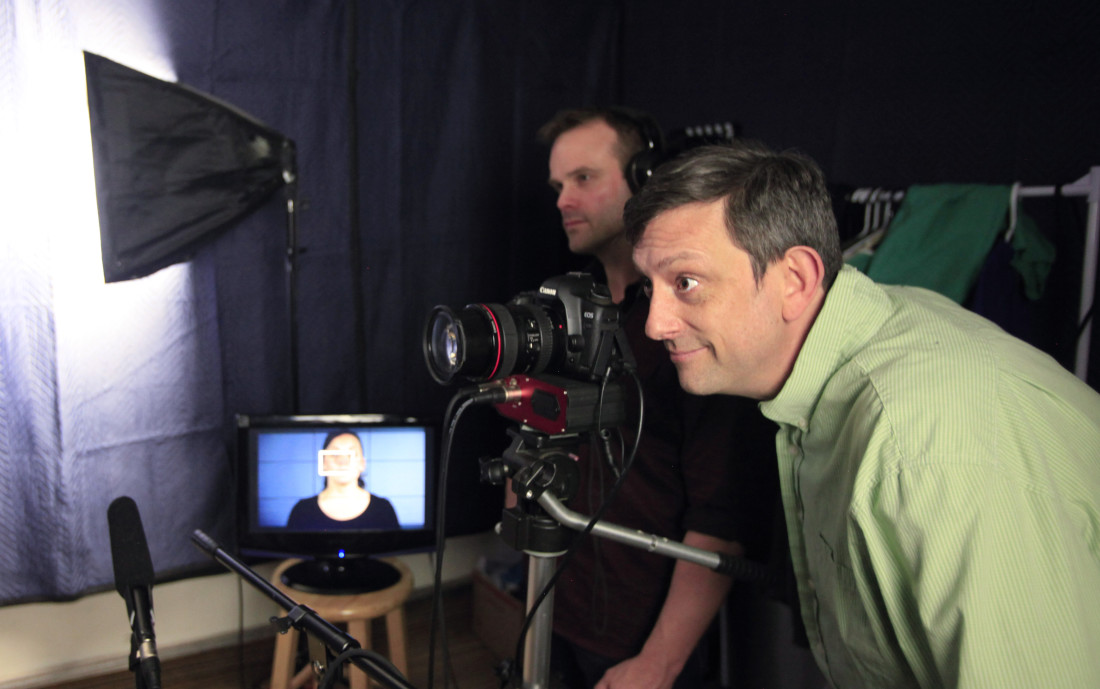Thousands of aspiring actors and filmmakers across the country dream of finding work in the television and film industry. Asheville-area schools that focus on performance and production are increasingly making those dreams a reality.
The business of acting
Kevin Patrick Murphy, owner and instructor at The Actor’s Center of Asheville, not only teaches the craft of acting and how to work on camera, but also the industry’s business side. Every incoming student is put on an individual business plan that includes targeting agents, developing relationships with casting directors and creating their own work.
“I have a handful of agents here in the Southeast who I’ve sent students of mine to,” Murphy says. “[The agents] sign them and then [the actors] are fortunate enough to book a bunch of work, which makes it easier for me to send people to [the agents].”
A working actor himself who had a significant role in the recent season finale of “The Walking Dead,” Murphy trains his students to be at least day players with the goal of working up to being TV series regulars, typically a six- to eight-month job. Many productions on which they find work are based in Atlanta, but opportunities abound from Pittsburgh to New Orleans. To vie for parts across the region, actors must tape and submit auditions, which they record in The Actor’s Center’s soundproof, state-of-the-art room. The quality of lighting and sound is of such a high professional level that when Asheville actor Dave MacDonald showed a recent audition to a New York-based acting peer, the friend was blown away by the clip’s all-around clarity and said its production value was far superior to what’s typically seen in his market.
These advantages helped MacDonald land a speaking role in the “House of Cards“ season four finale and book a guest spot on the CBS drama “The Inspectors,” for which he was cast solely from a taped audition. The latter gig was the first time in his career — including a decade in Los Angeles — that he’s booked work without a callback. It was also an experience where his Actor’s Center training proved vital. Twenty minutes before shooting a scene on the Charleston, S.C., production of “The Inspectors,” MacDonald was handed a script change with what he calls “supertechnical language” intended to make his FBI agent sound smarter. Thanks to Murphy’s “stress inoculation” class exercises that simulate these potential nightmare scenarios, MacDonald was amply prepared, able to calmly switch gears and nailed his new lines in a mere three takes.
Augmenting the toolkit
Open just shy of a year, Asheville School of Film offers introductory courses that provide a solid groundwork of filmmaking knowledge and help students decide whether they’d like to pursue the craft as a hobby or profession. More advanced classes are designed to augment filmmakers’ toolkits, such as an early April weekend cinematography workshop that afforded camera operators, most of whose experience had been exclusively digital, the opportunity to shoot on celluloid.
“Understanding how to tell a story visually is the crux of all our classes,” says Brad Hoover, ASoF’s co-owner and primary instructor. “It’s where technical and creative sides meet. We look at what it is that connects your ideas in a physical way and make them into something that may be seen on the screen and understood in the sense of a story.”
In his 21 years of teaching, Hoover has had many students land jobs around the country as production assistants, a potential entry point into film and television that he’s seen evolve in recent years. Since North Carolina, South Carolina and Georgia are nonunion states, productions aren’t required to pay union wages to PAs. Though these low-paid positions have traditionally been limited to grunt work like running errands, PAs now often find themselves tasked with jobs intended for trained tech workers, such as running sound or even shooting second-unit footage. Those with that specialized knowledge may then separate themselves from the less-skilled PAs and gain an advantage, potentially advancing their careers. Hoover has both sent off prepared students for such work and provided additional training to former PAs looking for higher-paying jobs.
One of his former students is Kira Bursky. The 19-year-old Asheville-based filmmaker calls her tutelage under Hoover at Carolina Film Institute in Greenville, S.C., “an explosion of delightful film knowledge and possibility” and her catalyst into the film world. “He enlightened me on the technical, artistic and business sides of filmmaking. From lighting to storytelling to producing, I went from making little videos on my own to being able to run a set and crew with understanding,” Bursky says.
Since studying with Hoover, Bursky has gone on to direct or co-direct over 30 shorts and screen her films at festivals around the world. She has been hired for freelance video work, most notably for Tesla Motors as a co-director and cinematographer on an instructional video. The teacher and former pupil now collaborate on professional projects, with Hoover serving as cinematographer on many of Burksy’s shorts. The two are currently in preproduction on Bursky’s second film for the Polish fashion eyewear company Massada Eyewear, on which Hoover will again be in that technical role.
To learn more, visit theactorscenterasheville.com and ashevilleschooloffilm.com



Before you comment
The comments section is here to provide a platform for civil dialogue on the issues we face together as a local community. Xpress is committed to offering this platform for all voices, but when the tone of the discussion gets nasty or strays off topic, we believe many people choose not to participate. Xpress editors are determined to moderate comments to ensure a constructive interchange is maintained. All comments judged not to be in keeping with the spirit of civil discourse will be removed and repeat violators will be banned. See here for our terms of service. Thank you for being part of this effort to promote respectful discussion.